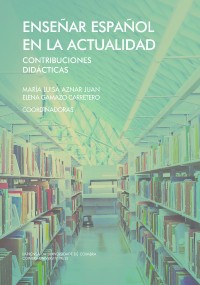Please use this identifier to cite or link to this item:
https://hdl.handle.net/10316.2/41006| DC Field | Value | Language |
|---|---|---|
| dc.contributor.author | Fidalgo Enríquez, Francisco José | |
| dc.date.accessioned | 2017-02-02T16:32:18Z | |
| dc.date.accessioned | 2020-09-08T12:39:35Z | - |
| dc.date.available | 2017-02-02T16:32:18Z | |
| dc.date.available | 2020-09-08T12:39:35Z | - |
| dc.date.issued | 2016 | - |
| dc.identifier.isbn | 978-989-26-1230-0 | |
| dc.identifier.isbn | 978-989-26-1231-7 (PDF) | |
| dc.identifier.uri | https://hdl.handle.net/10316.2/41006 | - |
| dc.description.abstract | In this article is studied the concept of culture according to the guidelines set by the Common European Framework of Reference for Languages in the sociocultural competence. Our proposal to reflect on the sociocultural competence advocates that the apprehension of this competence should not be static but dynamic and pragmatic as he defends the concept of communicative competence. Thus, the acquisition of sociocultural competence should not be restricted to obtain a competence but achieve intercultural awareness among the diverse cultures that reside in the L1 and L2. In this regard, we intend to reflect on some key issues, in our view, for the E/LE with special attention to the case of lusophones. | eng |
| dc.description.abstract | En este artículo se aborda el concepto de cultura conforme a los trazos marcados por el Marco Común Europeo de Referencia para las Lenguas en los contenidos socioculturales. Nuestra propuesta de reflexión sobre los contenidos socioculturales propugna que la aprensión de estos contenidos no debe ser estática sino dinámica y pragmática como defiende el concepto de competencia comunicativa. Así, el proceso de adquisición de los contenidos socioculturales no debe cifrarse únicamente en obtener una competencia sino en adquirir una consciencia intercultural entre las diversas culturas que anidan en la L2 y en la L1. En este sentido, pretendemos reflexionar sobre algunos aspectos determinantes, a nuestro parecer, para la E/LE con especial atención en el caso de los lusohablantes. | por |
| dc.language.iso | spa | - |
| dc.publisher | Imprensa da Universidade de Coimbra | por |
| dc.relation.ispartof | http://hdl.handle.net/10316.2/41003 | por |
| dc.rights | open access | - |
| dc.subject | Sociocultural competence | eng |
| dc.subject | sociocultural awareness | eng |
| dc.subject | culture | eng |
| dc.subject | E/LE | eng |
| dc.subject | lusophones | eng |
| dc.subject | Contenidos socioculturales | por |
| dc.subject | consciencia intercultural | por |
| dc.subject | cultura | por |
| dc.subject | E/LE | por |
| dc.subject | lusohablantes | por |
| dc.title | El componente intercultural en la enseñanza de español: el caso de los luso hablantes | por |
| dc.type | bookPart | por |
| uc.publication.collection | Investigação | por |
| uc.publication.firstPage | 64 | - |
| uc.publication.lastPage | 78 | - |
| uc.publication.location | Coimbra | por |
| dc.identifier.doi | 10.14195/978‑989‑26‑1231-7_3 | - |
| uc.publication.digCollection | PB | por |
| uc.publication.orderno | 3 | - |
| uc.publication.area | Artes e Humanidades | por |
| uc.publication.bookTitle | Enseñar español en la actualidad: contribuciones didácticas | - |
| uc.publication.manifest | https://dl.uc.pt/json/iiif/10316.2/41006/204887/manifest?manifest=/json/iiif/10316.2/41006/204887/manifest | - |
| uc.publication.thumbnail | https://dl.uc.pt/retrieve/11069459 | - |
| uc.publication.parentItemId | 54664 | - |
| uc.itemId | 68993 | - |
| item.fulltext | With Fulltext | - |
| item.grantfulltext | open | - |
| Appears in Collections: | Enseñar español en la actualidad: contribuciones didácticas | |
Files in This Item:
| File | Description | Size | Format | |
|---|---|---|---|---|
| el_componente_intercultural.pdf | 5.06 MB | Adobe PDF |  |
Items in DSpace are protected by copyright, with all rights reserved, unless otherwise indicated.
